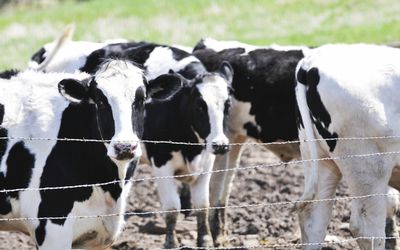BMW’s car-assembly plant in SA is doing its bit to help the German car maker edge towards a global target to supply all its production with renewable energy — it is getting some of its power from cow manure.
The company has agreed to a 10-year deal to buy as much as 4.4MW of electricity from a biogas plant about 80km from its factory northwest of Pretoria. Surrounded by land where about 30,000 cattle graze, the operation runs off gas emitted by a fetid mixture of dung and organic waste, ranging from sour yogurt to discarded dog food.
The deal with Bio2Watt, the closely held company that operated the power plant, was struck to bring Munich-based BMW a step closer to its renewable target, spokesman Diederik Reitsma says.
The biogas facility, when ramped up to full capacity, will represent 25%-30% of the electricity consumption at BMW’s factory, he says.
“We are a big consumer, so that’s a lot,” Mr Reitsma says. “It’s waste no longer wasted.”
BMW already purchased about 51% of its energy from renewable energy sources, the company says. In SA, the car maker may consider other clean-energy sources, including solar for the Rosslyn factory, which was BMW’s first foreign plant when it was established in 1973. The facility produces more than 60,000 3-Series sedans a year for local and export markets and produced its one-millionth vehicle in February.
For local food and waste companies, supplying the station is a convenient and environmentally friendly way to get rid of organic waste that the government is seeking to divert from landfills. The plant also receives waste from several large food companies, Bio2Watt CEO Sean Thomas says.
“You are looking at around 500 tons of waste coming onto the site every day being processed at the plant,” says Mr Thomas. “A lot of the consultants, the waste companies, are knocking on the door.”
Fresh manure
At full production, the Bio2Watt plant will get daily manure deliveries — “as fresh as possible”, says Mr Thomas — of about 160 metric tons. The site’s other primary feedstock is paper sludge from the local unit of US toilet-tissue maker Kimberly-Clark, while the rest is a hodgepodge of fruit and vegetable leftovers, fat from restaurants, abattoir waste, yogurt, dog food and expired carbonated drinks.
While BMW is purchasing power generated at the biogas plant, the energy will be fed into the local grid, which then connects to the car plant via the city of Tshwane’s electricity distribution network. Tshwane will facilitate the billing process.
And the stench? After some time at the site, “you don’t smell it anymore”, says Mr Thomas, who visits the project at least once a week. “The problem is if you go to a meeting afterwards, it’s in your clothes, it’s in everything.”
Bloomberg


